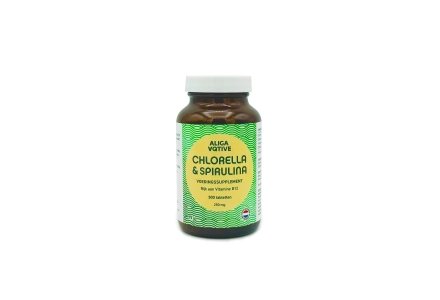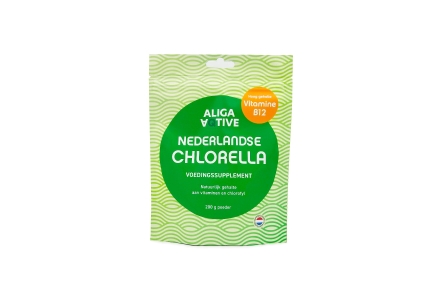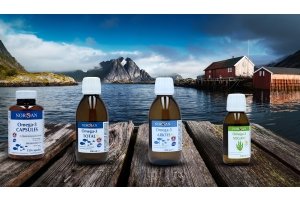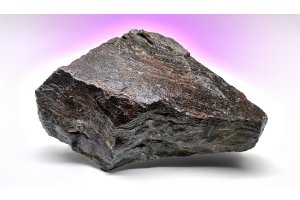
Welcome to this blog about algae. Algae are single-celled or multi-celled organisms that thrive in a variety of aquatic environments, from lakes to oceans. Although often overlooked, algae are one of the oldest life forms on Earth and contain a wealth of nutrients. There are many types of algae, including Spirulina and Chlorella, two of the most studied and prized algae for their nutritional density and health benefits. Let's take a deep dive into the world of algae and discover why we consider them superfoods.
What are Algae
Algae or seaweeds are single-celled or multi-celled organisms that use photosynthesis to convert energy from sunlight into nutrients. They are a diverse group and can be found in a variety of environments, such as oceans, lakes, rivers, and even on moist surfaces such as rocks and trees. Some important characteristics of algae are:
- Photosynthesis: Algae are capable of photosynthesis, using sunlight to convert carbon dioxide and water into glucose and oxygen. This process is essential for the production of food and oxygen in many ecosystems.
- Diversity: Algae are a diverse group of organisms, including green algae, brown algae, red algae, blue-green algae (cyanobacteria), and diatoms. They differ in size, shape, structure and life cycle.
- Environmental Importance: Algae play a crucial role in ecosystems by providing food and oxygen to other organisms. They are also involved in the carbon cycle by absorbing carbon dioxide from the atmosphere.
- Biotechnological uses: Algae have promising applications in various industries. They are used for the production of biofuels, food additives, medicines and even as biofertilizers.
- Aquaculture: Algae are often grown in aquaculture for various purposes, such as fish and shellfish food, water purification, and as a raw material for various industrial processes.
- Nutrition: Some algae are used as food for humans. For example, seaweed, a type of brown algae, is consumed across cultures. In addition, algae are used as nutritional supplements due to their rich content of vitamins, minerals and other nutrients. Such as Chlorella and Spirulina.
All in all, algae play a crucial role in various ecological and industrial processes and contribute to environmental and human health.
Algae as superfoods
Algae are considered superfoods due to their exceptionally high concentration of nutrients and health-promoting properties. Below is a brief summary of why this is the case:
- Rich in nutrients: Algae, such as spirulina and chlorella, are very rich in nutrients such as proteins, vitamins (especially B vitamins), minerals (iron, calcium, magnesium), chlorophyll and antioxidants. These nutrients are essential for good health and well-being.
- Complete protein: Some algae contain an impressive amount of high-quality protein, including all the essential amino acids that the human body cannot produce on its own. This makes algae a valuable source of protein, especially for vegetarians and vegans.
- Omega-3 fatty acids: Certain algae, such as microalgae, are a plant source of omega-3 fatty acids, especially EPA (eicosapentaenoic acid) and DHA (docosahexaenoic acid). These fatty acids are beneficial for heart and brain health.
- High Chlorophyll Content: Chlorophyll, the green pigment in algae, has powerful antioxidant properties and is sometimes considered a natural detoxifying agent for the body. It also helps purify the blood and promote healthy skin.
- Minimal calories and fat: In general, algae are low in calories and fat, making them suitable for those looking for nutritious, low-calorie food options.
- Iodine source: Some algae, especially brown algae such as kombu, are a natural source of iodine. Iodine is essential for healthy thyroid function, which is important for regulating metabolism.
- Immune Support: The presence of several bioactive compounds in algae can boost the immune system and help protect against disease.
- Sustainability: Growing algae is generally environmentally friendly, as they require little land and water compared to traditional agricultural crops.
Algae as a nutritional supplement
Although you can eat some types of algae, such as seaweed, they are often offered in the form of nutritional supplements. In this form, Spirulina and Chlorella are two of the most common.
Spirulina is a blue-green freshwater algae known for its exceptional protein content and complete amino acid profile. Spirulina grows in standing alkaline water in lakes and ponds. This algae has a spiral shaped structure. Spirulina means 'little spiral' in Latin. The algae also contains a range of vitamins, including vitamin A, B vitamins and vitamin K, as well as minerals such as iron, magnesium and calcium. In addition, spirulina is one of the richest sources of antioxidants, such as phycocyanin, which has anti-inflammatory properties and supports the immune system.
Chlorella is a green, single-celled freshwater algae and chlorella means 'little green leaf'. This algae is known for its ability to bind and remove heavy metals and toxins from the body. It is also an excellent source of chlorophyll, which can help detoxify and purify the body. In addition, chlorella contains an impressive amount of iron, vitamin C and omega-3 fatty acids, which can contribute to healthy circulation and balanced cholesterol levels.
Possible effects of algae on health
Using algae, especially Spirulina and Chlorella, in tablets or powder form, can have various effects on the body. These effects may vary depending on the specific species of algae, the dosage and the individual body's response. Below is a general description of what you may notice when using Spirulina or Chlorella.
When using Spirulina as a dietary supplement:
- Increased energy: Spirulina contains high levels of nutrients, including proteins, vitamins and minerals, which can contribute to an increase in energy levels.
- Improved immune function: The antioxidants and bioactive compounds in spirulina can boost the immune system.
- Nutrient replenishment: Spirulina is a source of complete protein and contains essential amino acids, vitamins (particularly B vitamins) and minerals (such as iron and magnesium). It can help replenish nutrients that may be missing from the diet.
- Detoxification: Chlorophyll, the green pigment in spirulina, is sometimes considered a natural detoxifying agent. It can help remove toxins from the body.
- Improved digestion: The fiber in spirulina can promote digestion and help maintain healthy intestinal function.
When using Chlorella as a dietary supplement:
- Detoxification: Chlorella is often considered a “detox” supplement due to its potential ability to bind and remove heavy metals and other toxins from the body.
- Increased energy: Chlorella contains a range of nutrients, including proteins, vitamins, minerals and chlorophyll. Its use may lead to an increase in energy levels in some people.
- Immune Support: The presence of antioxidants and nutrients in Chlorella can support the immune system.
- Improved digestion: Chlorella contains fiber and can promote digestion
- Improved focus and mental clarity: Some users report improved mental clarity and focus as a result of using chlorella, although more research is needed to confirm these effects.
Use and safety
When using Spirulina and Chlorella products it is important to start with a low dose and gradually increase to the recommended dose to give the body time to adapt and minimize any negative reactions. It is also recommended to choose products of high quality and purity. Combining Spirulina and Chlorella is quite possible and can provide synergistic benefits due to their complementary and reinforcing properties.
Finally, it is important to note that the response to nutritional supplements can vary individually. It is always wise to exercise caution when introducing new supplements, especially if you are pregnant, breastfeeding, have specific health conditions, or are taking other medications. In that case, consult with a health professional before making any major changes to your diet or supplement regimen.
Conclusion
Algae can be considered powerful superfoods that provide a wealth of nutrients and have numerous health benefits. Algae can be found in the form of food or as nutritional supplements. Common algae in nutritional supplements are Spirulina and Chlorella.
Meditech Europe is ready to advise and guide you in discovering the world of algae and their potential benefits. Our Orthomolecular Therapist, Cynthia, is happy to assist you and support you in this quest. You can contact us via info@meditecheurope.nl or +31527 292 331.






